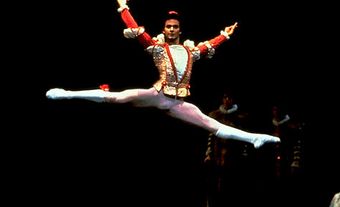Montréal Danse
Montréal Danse is a mid-sized contemporary dance company founded in Montréal in 1986 by Paul-André FORTIER and Daniel Jackson. Its mandate - to promote a repertoire of original works created by local or international choreographers - is unusual in a dance landscape where companies are founded to reflect the sole artistic vision of their founder/choreographer.
The many works commissioned by Montréal Danse show the eclecticism of local and international dancemakers. Ghost Stories (1990) by Natsu Nakajima was inspired by Butoh; Françoise SULLIVAN'SCycle (1987) had ritualistic features; Susan Marshall's Lines from Memory (1994) and Jean Gaudin's L'homme qui essaie devant la gare d'embrasser (1993) were both openly theatrical. Québec's style of dance theatre was represented in works by choreographers James KUDELKA, Paul-André Fortier, Ginette LAURIN, Hélène Blackburn and Daniel Léveillé.
In 1989 Fortier resigned his role as co-artistic director, although he maintained his association as a choreographer. Daniel Jackson, dancer, rehearsal director and co-artistic director for LES GRANDS BALLETS CANADIENS, remained sole artistic director of Montréal Danse until his retirement in 1996. He was succeeded by Kathy Casey, who had danced with Susan Marshall and Lar Lubovitch. The company commissioned works that were both theatrical and accessible, such as Paula de Vasconcelos's Lettre d'amour à Tarantino and Montréal dancer and choreographer José NAVAS's Enter: Last.
In 2000, Estelle Clareton's Je ne m'en souviens pas très bien heralded an ongoing relationship between herself and the company. By 2011 Clareton had choreographed 4 works for Montréal Danse, including S'Envoler (2010), which was shown at the prestigious Festival TransAmériques. The styles of Clareton and fellow dancemakers Sarah Chase, Martin Bélanger, Benoît Lachambre and George Stamos offered a new dynamic approach that differed from the theatricality of the company's earlier days.
Montréal Danse has broadened its scope by constantly questioning the meaning of movement in the body and developing new ways to bring these discoveries to the stage. In 2002 the company began an open-ended series of choreographic research workshops. Some of these involved pure exploration; others were conferences and public exchanges; still others were held outside the studio in social settings where company members discussed issues with guests (dramaturges, for example).
Since 2009, as part of the international Dance Against Violence project, the company has brought workshops into women's shelters to help victims of conjugal violence re-experience the safety of their own bodies.
By 2011, Montréal Danse's repertory included more than 50 diverse works performed by artists of all ages, including 2 company founding members. Its increasingly numerous co-productions have toured extensively in Canada, the US, South America and Europe.

 Share on Facebook
Share on Facebook Share on X
Share on X Share by Email
Share by Email Share on Google Classroom
Share on Google Classroom


